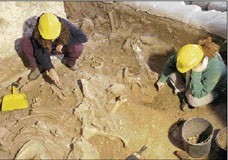
Archaeologists discover ancient horse skeletons
Israel Antiquities Authority archaeologists conducting a salvage dig in the Armenian monastery in Jaffa expected to find artifacts connected to the ancient fortifications of the city. However, a few days ago they were surprised to discover, some 60 centimeters below the monastery floor, no fewer than 10 horse skeletons.
Excavation directors Amit Re´em and Martin Peilstoker said yesterday the horses may have died in battle, and if so, it occurred long before the 17th century, when the monastery was constructed. It was possible, the archaeologists said, that the horses were buried as early as the Hellenistic period, about 2,200 years ago, or in the Early Arab period, 1,500 years ago. The archaeologists assume the horses were buried outside the city wall because of the stench of them decaying.
«This is the last thing we expected find here» Re´em said yesterday. «If we continue the dig we may find arrowheads or other artifacts that attest to a battle the horses were involved in.» Re´em and Peilstoker are now trying to ascertain the breed of the horses and how they died, with the assistance of Hebrew University veterinarians. «Work on the remains is very delicate, and every detail can move us ahead. I believe we´ll know in a week or two» Re´em said.
«So many horse skeletons in one place is rare and special. They may have died in battle or from a plague. Laboratory tests will reveal what kind of horses they were and what they were used for. At the moment we know they were adult males, which suits the theory they were battle horses» Hadas Moto of the Hebrew University Faculty of Agriculture, who is heading a team examining DNA samples from the remains, said.
Although horses were widely used in battle and as beasts of burden, few remains have been discovered. «From a historical perspective, there is a chance the horses attest to a battle that we´ll be able to date. Historical sources describe various battles in this area, and here we have a rare chance to see who took part in them,» Re´em said.
The Armenian monastery served at one time as a caravansary for pilgrims. Napoleon Bonaparte quartered plague-infected soldiers here, and when they became a burden he is said to have ordered them shot on the Jaffa beach.
